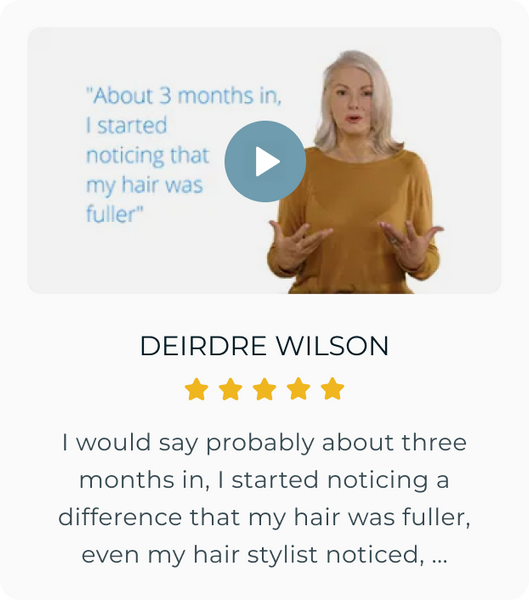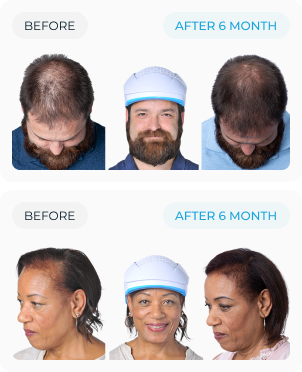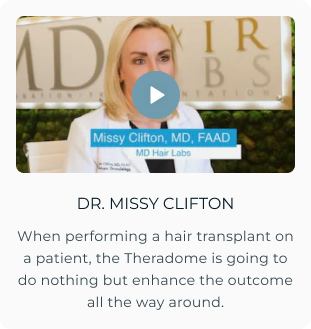Walk into any beauty aisle and you’ll see it right away. Rows of pastel tubs and glossy gummies promising longer, thicker, fuller hair. Collagen. Biotin. Sparkly claims. Polite asterisks. It feels hopeful because it is. We want simple. We want “take this and grow.”
But hair biology is not a fairy tale. It is stubbornly physiological. Hair follicles live by rules: genetics, hormones, growth cycles, micro-inflammation, energy supply. Supplements sit in the background of that story. Sometimes helpful. Often… ornamental.
This article does two things at once. First, it explains what collagen and biotin actually do inside the body, not just on the label. Second, it compares that promise to the clinical evidence for hair growth, then places both within a full strategy that respects real causes of thinning.
Now, who is this for?
Anyone staring down early thinning or chronic shedding and wondering if a scoop of collagen or a biotin chew will meaningfully change the outcome. We’ll tell you where these fit and, bluntly, where they don’t. Fair warning: some hype will not survive.
Understanding Collagen
Collagen is the body’s scaffolding protein. Types I and III dominate in skin, including the scalp dermis that surrounds follicles. When you ingest collagen peptides, they are digested into di- and tripeptides that appear in the bloodstream and can reach the skin. There is decent human evidence that oral collagen improves skin hydration and elasticity. That is not identical to proving hair growth, though marketers often blur this line.
Hair-specific trials are fewer, often combine multiple ingredients, and tend to measure appearance outcomes more than hard counts. Some early signals exist, but they are not robust enough to declare collagen a stand-alone regrowth therapy.
If collagen were an on-switch for hair, we would see consistent randomized trials with increased hair counts and thicker shafts in both sexes across common forms of alopecia. We do not. Not yet.
How Collagen Supports Hair Health?
Collagen is found abundantly in your skin, including the dermis—the layer responsible for housing hair follicles. A strong, elastic dermis creates an environment where hair follicles can function optimally, thanks to improved hydration and resilience.
Collagen also provides essential amino acids that your body uses to produce keratin, the structural protein that gives your hair strength and flexibility. However, it’s crucial to keep expectations grounded: while collagen can support hair health, it’s not a magical cure for regrowing lost hair.
Here’s where collagen shines: it helps combat oxidative stress caused by free radicals, which accelerate aging and weaken hair follicles. By acting as a natural antioxidant, collagen neutralizes free radicals, reducing damage and slowing down age-related hair thinning. Studies suggest that collagen supplementation can help improve hair thickness and reduce shedding, but only as part of a balanced diet and lifestyle.
It’s important to note that collagen works best as a supporting player in your overall nutrition strategy. A lack of collagen-rich foods over time may lead to deficiencies that manifest in your skin and hair.
So, while supplementation can fill gaps, moderation is key—more collagen doesn’t necessarily mean better results. Instead, focus on maintaining a diet rich in collagen-friendly foods like bone broth, fish, and egg whites to keep your hair and scalp in peak condition.
Sources of Collagen
Collagen is an essential structural protein, but here’s the kicker: most Americans already consume enough collagen through their daily diets. Natural sources like bone broth, fish, chicken skin, and egg whites provide plenty of collagen-building amino acids. While these foods are nutrient-packed and beneficial for overall health, the claim that extra collagen directly enhances hair growth isn’t conclusively proven.
Collagen supplements, often marketed for hair growth, are available as powders, capsules, or collagen-infused beverages. While early research shows some promise in improving hair health, current evidence suggests only modest benefits, particularly for those already consuming a balanced diet. For now, the science on collagen supplementation as a surefire method for hair growth remains inconclusive.
Before investing in pricey collagen products, weigh your options and do your homework. A nutrient-rich diet, packed with whole foods, is a more reliable strategy for supporting your hair’s health—and your wallet might thank you for it, too.
Understanding Biotin
Biotin is vitamin B7, a water-soluble coenzyme. Inside cells, it helps several carboxylase enzymes do metabolic housekeeping, which includes energy production and fatty acid synthesis. Because hair shafts are mostly keratin, and keratin depends on a functioning cellular assembly line, biotin is often advertised as the “hair vitamin.” Reasonable on the surface. Misleading in practice.
In people with adequate intake, extra biotin has not been shown to regrow scalp hair. True biotin deficiency is rare and usually tied to genetics, severe malnutrition, or specific medical scenarios. Correcting a deficiency helps. Adding more on top of “enough” does not magically switch on dormant follicles.
Yes, many multivitamins include biotin. That is not the same as saying biotin treats hair loss.
How Biotin Supports Hair Health?
Biotin is often called the "keratin booster" for good reason. It plays a critical role in the production of keratin, the structural protein that makes up your hair. Keratin is the backbone of each strand, giving it strength and flexibility. Without adequate biotin, keratin production can falter, leading to weaker, brittle hair that’s more prone to breakage.
The biotin benefits for hair include fortifying the strands you already have and improving their resilience, making it a must-have for anyone seeking healthier locks.
Biotin Deficiency and Hair Thinning
Biotin deficiency is extremely rare. Most people don’t need to worry about it unless their diet lacks variety or they have underlying medical conditions affecting nutrient absorption. While symptoms of severe deficiency, like thinning hair and excessive shedding, can occur, these cases are the exception rather than the rule. In fact, deficiencies in other vitamins, such as Vitamin D3 and B12, are far more common concerns.
Biotin is widely available in both animal and plant-based foods, making it easy to meet your daily needs with a balanced diet. Foods like eggs, nuts, seeds, sweet potatoes, and spinach are excellent sources. For most, a diet rich in these natural options provides plenty of biotin without needing supplements. Severe biotin deficiency, which may warrant supplementation, should only be addressed under expert guidance.
By addressing the root of hair issues, biotin sets the stage for better growth and stronger strands. Its role in keratin production and its ability to combat deficiency-related hair loss make it a player in hair health.
Biotin vs. Collagen for Hair Growth: Which is Better?
When it comes to collagen vs biotin for hair growth, each brings its own strengths to the table. But are they competing for the title of hair hero, or is there a case for teamwork? Let’s break it down.
Biotin: What the Science Really Says
Biotin works its magic by enhancing keratin production, the protein that gives your hair strength and structure. For those with biotin deficiencies, the results can be striking—thicker strands, reduced breakage, and healthier hair overall. However, if you’re not deficient in biotin, you may not notice dramatic biotin hair growth results, as your body likely has enough for regular hair maintenance.
Does Biotin Help Hair Growth in Non-Deficient People?
Short answer. No convincing evidence. Systematic reviews focused on biotin and hair loss consistently find that outside deficiency states there are no high-quality randomized controlled trials showing increased hair counts, thicker shafts, or durable regrowth attributable to biotin alone.
Many positive stories trace back to case reports, small series, or multi-ingredient formulas where biotin’s role cannot be isolated. Even when subjective improvements are reported, objective hair metrics often do not budge. Biotin is not a regrowth switch for healthy, non-deficient adults.
People sometimes say their hair “feels” better on biotin. That may reflect nail improvements, placebo, or normal cycling. It is not proof of new follicles reactivating.
Safety note
High-dose biotin can distort lab results. Thyroid function can look hyper or hypo when it is not. A troponin test can look normal when urgency is real. The fix is straightforward. Disclose biotin use. Follow your lab’s guidance on how long to pause before testing. And if you truly need biotin for a diagnosed deficiency, coordinate timing.
We do not recommend biotin as a hair regrowth aid for the general population. If a clinician confirms a deficiency, correct it. If not, your effort and budget are better directed elsewhere. The hair cycle respects physiology, not wishful thinking.
Collagen: A Little More Promise, Still a Lot of Hype
Collagen focuses on the foundation—your scalp. This powerhouse protein strengthens the dermis, improves hydration, and fights oxidative stress, all of which support healthier follicles and reduce shedding. Studies suggest that consistent oral collagen consumption MAY benefit your hair. But again, no clinical data supports this conclusively.
Hair-specific trials with oral collagen exist, but many are multi-ingredient formulas or focus on cosmetic appearance and scalp comfort rather than objective hair counts. In at least one blinded trial of a collagen-based nutraceutical in women, subjective hair appearance improved yet hair counts did not significantly change over the study window. That finding matters. People felt better about how their hair looked. The follicles did not demonstrably produce more hairs per square centimeter.
Meanwhile, the strongest collagen evidence still clusters around skin benefits, which we do not discount. Better dermal quality may indirectly support a healthy scalp environment. Indirect is the operative word.
Collagen for Hair
If your goal is glowing skin and you like a daily ritual, collagen can be a reasonable wellness choice. For scalp hair regrowth, the evidence is early, inconsistent, and frequently confounded. Collagen is not a replacement for therapies that act on the drivers of androgenetic miniaturization or that directly stimulate follicles.
You will also see ranges of dose, source, and peptide composition across products, which complicates both research and consumer expectations.
Diets that already meet protein needs can support keratin production without a specialized collagen powder. Collagen is optional, not compulsory, for most people.
Collagen and Biotin Together for Hair
Here’s the twist: it’s not an either-or situation. Collagen and biotin complement each other beautifully. Collagen ensures your scalp and hair follicles are healthy, while biotin ensures the strands they produce are strong and resilient. Together, they offer a balanced approach to tackling both the root and structural challenges of hair growth.
What Really Works: Evidence-Based Hair Regrowth Therapies
Minoxidil
Minoxidil extends anagen and may increase follicular size. In real life that means more hairs are in the growth phase at any given time and each hair strand can widen. Topical solutions and foams have long safety records. Consistency matters. Results typically appear after three to six months with continued improvement to one year.
Some clinicians now use low-dose oral minoxidil for select patients, which can be effective but deserves a nuanced risk-benefit discussion and medical supervision. No magic. Just physiology, applied daily.
Finasteride for men
Finasteride reduces conversion of testosterone to dihydrotestosterone. In male pattern hair loss it slows miniaturization and often stabilizes progression. It is not for women of childbearing potential, and even in men it requires informed consent about possible side effects.
When it works, it works by removing the biochemical pressure that kept follicles shrinking. Many men pair finasteride with topical minoxidil. That combination targets both the hormonal driver and the growth cycle.
Laser Phototherapy (LPT)
LPT uses cold low-power lasers to deliver specific wavelengths to the scalp. The goal is photobiostimulation: encouraging mitochondrial activity, modulating inflammation, and nudging follicles toward anagen without heat or tissue damage.
Clinical trials, including sham-controlled designs, show increases in hair counts and thickness in both men and women with androgenetic alopecia. The safety profile is favorable. Home devices are FDA-cleared for this indication, which means they met a substantial-equivalence standard compared with predicate devices.
A practical advantage of LPT is that it reaches the actual target tissue. Supplements must be digested, absorbed, distributed, and then hope to influence a pathway that may not be the bottleneck. LPT delivers light energy straight to the scalp, session after session, with no needles and no downtime.
If you have been told lasers sound dangerous, remember we are talking about cold lasers used at low optical power. They do not burn. They do not scar. They do not require the risk-benefit calculus of ablative procedures. Think of it as structured, amplified light bathing the scalp in a very specific way. Like sunbathing, minus heat, with a cellular purpose.
Also, platelet-rich plasma and microneedling have growing evidence as add-ons, especially when paired with minoxidil. Protocols vary and outcomes are heterogeneous, which is a fancy way of saying results can be excellent or modest depending on technique and patient biology. Sensible clinics set expectations accordingly.
The pattern should be clear by now. Evidence-based therapies do one of two things. They either remove a brake on follicles or they apply a gas pedal that biology recognizes. LPT belongs in the latter camp.
When to Supplement — And When to Save Your Money
Start with evaluation, not shopping. If you are shedding, ask your clinician about checking ferritin, TSH and related thyroid markers, and sometimes vitamin D and zinc depending on history. Correcting iron deficiency in telogen effluvium can help the hair cycle stabilize. Treating thyroid disease can do the same. Targeted therapy beats diffuse guesswork.
When might biotin be appropriate? When a clinician documents deficiency or a condition that increases biotin requirements. That is clear. Outside that, skip it. Also, coordinate any biotin timing with upcoming labs to avoid test interference.
When might collagen make sense? If you are seeking skin benefits and enjoy the ritual. If your diet is protein-poor and a peptide supplement helps you meet daily protein needs, fine. But set expectations for hair. Collagen is, at best, a supporting actor for scalp environment, not a lead for regrowth.
Where should most of the budget go? Evidence-based therapies. Laser Phototherapy as a safe, at-home modality that directly engages follicles. If resources allow, adjuncts like PRP or microneedling can be considered with a reputable clinic.
Look, if a purchase is mainly about hope, pause. If it is about a mechanism you can describe in one sentence that aligns with your diagnosis, proceed. That small test protects wallets and expectations.
Conclusion
So… collagen or biotin? If the question is “Which one will regrow my hair?” the honest answer is “neither,” unless you are correcting a rare, documented biotin deficiency. Collagen can support skin quality and may make the scalp feel better. Nice. Just not the lever that reverses miniaturization.
A better question is “What gets my follicles producing again, safely, at home, predictably?” Start with fundamentals. Identify your type of hair loss. Rule out triggers like low iron or thyroid imbalance. Choose therapies with mechanisms aligned to your diagnosis. Laser Phototherapy for both men and women, using a comfortable, FDA-cleared hair growth device like Theradome that delivers therapeutic light energy across the scalp.
If you love your collagen routine, keep it with realistic expectations. If a clinician tells you that you truly need biotin, take it and time labs accordingly. Otherwise, simplify. Focus on what moves outcomes and respect the cadence of regrowth. Follicles flourish when we stop asking them to respond to slogans and start giving them signals they recognize.

























